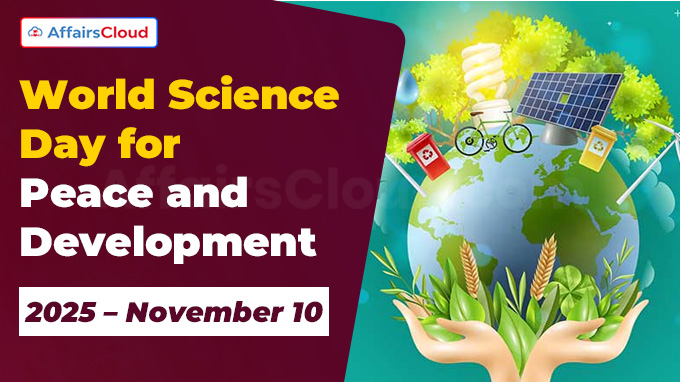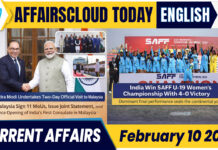The United Nations (UN)’s World Science Day for Peace and Development is observed annually across the globe on 10th November to highlight the role of science in society and encourages public engagement with emerging scientific issues.
- 10 November 2025 marks the 24th World Science Day for Peace and Development.
- The 2025 observance took place under the International Decade of Sciences for Sustainable Development (2024–2033).
Exam Hints:
- Event: World Science Day for Peace and Development
- When? November 10
- Edition: 24th
- 2025 Theme: “Trust, Transformation, and Tomorrow: The Science We Need for 2050”
Declared By: UNESCO in 2001 - First Observed: 10 November 2002
- Linked Initiative: International Decade of Sciences for Sustainable Development (2024–2033)
- International Week of Science and Peace (IWOSP) :9–15 November 2025
Theme:
2025 Theme: “Trust, Transformation, and Tomorrow: The Science We Need for 2050”
Focus: Highlights the critical role of science in advancing global goals and fostering a sustainable future.
Background:
Declaration: In 2001, the United Nations Educational, Scientific and Cultural Organization (UNESCO) declared 10 November of each year as World Science Day for Peace and Development.
First Celebration: The first World Science Day for Peace and Development was observed on 10 November 2002.
Proclamation: In August 2023, the United Nations General Assembly (UNGA) proclaimed the period 2024-2033 as the International Decade of Sciences for Sustainable Development.
International Week of Science and Peace(IWOSP) 2025:
Observance : The IWOSP is observed every year from November 9 to 15 to highlight the role of science in promoting peace and sustainable development.
Origin and Recognition: Established in 1986 during the International Year of Peace(IYP), the observance was officially recognized by the UNGA in 1988 through Resolution 43/61.
UNESCO Kalinga Prize for the Popularization of Science:
Establishment: Founded in 1951 through a donation by Bijoyanand Patnaik, Founder of the Kalinga Foundation Trust (India), the UNESCO Kalinga Prize stands as the organization’s oldest award honoring excellence in science communication.
Funding: The prize is jointly funded by the Kalinga Foundation Trust and the Government of Odisha and includes a cash award of USD 40,000 along with a UNESCO Albert Einstein Silver Medal.
- In August 2024, the Ministry of Science and Technology (MoS&T), Government of India(GoI) withdrew its support for the UNESCO Kalinga Prize.
2024 Awardee: The 2024 UNESCO Kalinga Prize for the Popularization of Science was awarded to Karl Kruszelnicki, an Australian science writer and journalist, for his exceptional efforts in making science accessible to all.
2025 Event:
Poster: In November 2025, UNESCO released the official World Science Day for Peace and Development poster featuring the theme “Trust, Transformation, and Tomorrow: The Science We Need for 2050.”
Multilingual Outreach: The poster is available in all six official UN languages: English, French, Spanish, Arabic, Chinese, and Russian, to promote global awareness.
About United Nations Educational, Scientific and Cultural Organization(UNESCO):
Director General(DG)– Audrey Azoulay
Headquarters– Paris, France
Established– 1945





